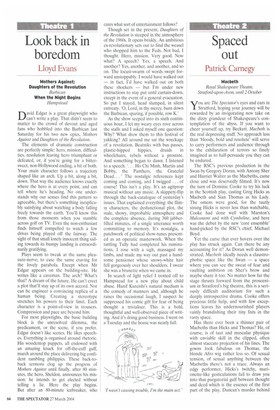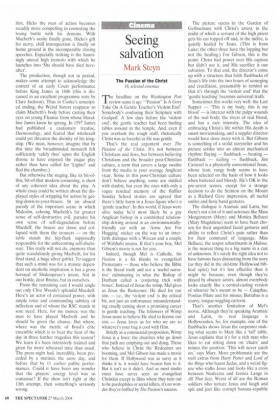Spaced out
Patrick Carnegy
Macbeth Royal Shakespeare Theatre, Stratford-upon-Avon, until 2 October
You are The Spectator's eyes and ears in Stratford, hoping your journey will be rewarded by an invigorating new take on the dizzy grandeur of Shakespeare's contemplation of the abyss. If you want to cheer yourself up, try Beckett. Macbeth is the real depressing stuff. No approach less than 'bloody, bold and resolute' will serve to carry performers and audience through to the exhilaration of terrors so finely imagined as to half-persuade you they can be endured.
The RSC's previous production in the Swan by Gregory Doran, with Antony Sher and Harriet Walter as the Macbeths, came close and was deservedly filmed. It's now the turn of Dominic Cooke to try his luck in the Scottish play, casting Greg Hicks as Macbeth and Sian Thomas as his Lady. The omens were good, for the tautly strung Hicks is never less than watchable, Cooke had done well with Marston's Malcontent and with Cymbeline, and here was the debut by the new 'core ensemble' hand-picked by the RSC's chief, Michael Boyd.
Yet the curse that ever hovers over the play has struck again. Can there be any accounting for it? As Doran well demonstrated, Macbeth ideally needs a claustrophobic space like the Swan — a space where you can see the sweat of fear and vaulting ambition on Sher's brow and maybe share it too. No matter how far the stage thrusts forward from the proscenium in Stratford's big theatre, this is a seriously difficult auditorium for such a deeply introspective drama. Cooke offers precious little help, and with few exceptions leaves his undernourished players vainly brandishing their tiny fists in the vasty space.
Has there ever been a thinner pair of Macbeths than Hicks and Thomas? He, of course, is of taut and muscular physique with enviable skill in the clipped, often almost staccato projection of his lines. The gowns look fabulous on Thomas, the blonde Afro wig rather less so. Of sexual tension, of sexual anything between the Macbeths there's not a trace. Always an edgy performer, Hicks's twitchy, marionette-like gesticulations fail to draw you into that purgatorial gulf between thought and deed which is the essence of the first part of the play. Duncan's murder behind him, Hicks the man of action becomes steadily more compelling in contesting the losing battle with his demons. With Macbeth's sanity finally gone, Hicks's gift for nervy, chill introspection is finally on home ground in the incomparable closing speeches. Especially striking is the hauntingly unreal high tremolo with which he launches into She should have died hereafter'.
The production, though not in period, makes some attempt to acknowledge the context of an early Court performance before King James in 1606 (this is discussed in an excellent programme note by Clare Jackson). Thus in Cooke's unscripted ending, the Weird Sisters reappear to claim Macbeth's body before casting their eyes on young Fleance from whose bloodline James knew he sprang. In 1597 James had published a cautionary treatise, Daemonology, and feared that witchcraft could yet threaten the divinity of his kingship. (We must, however, imagine that by this time the broadminded monarch felt sufficiently 'safely thus' upon the English throne to have enjoyed the risque play rather than have called for 'Lights!' and fled the chamber.) But otherwise the staging, like its bit-ofthis, bit-of-that modern costuming, is short of any coherent idea about the play. A whole essay could be written about the displayed styles of stripping for action by getting-down-to-your-braces. In an absurd parody of the important scene in which Malcolm, echoing Macbeth's far greater sense of self-destructive evil, parades his own sense of self-degradation before Macduff, the braces are down and collapsed with them the trousers — on the table stands the hip-flask supposedly responsible for the unbecoming self-disclosure. This really will not do, anymore than quite scandalously giving Macbeth, for his final stand, a huge silver goblet. To suggest that such a mind was for a minute dependent on alcoholic inspiration is but a gross betrayal of Shakespeare's intent. Not in our bottle, dear Brutus, but in ourselves.
From the remaining cast I would single out only Clive Woods's splendid Macduff. Here's an actor of contained power, with ample voice and commanding subtlety of inflection and of whom the RSC stands in sore need. Here, for my money, was the man to have played Macbeth and he should be given the chance. But where, where was the mettle of Boyd's elite ensemble which is to bear the heat of the day in three further tragedies this season? We learn it's been intensively trained and given far more rehearsal time than usual. The press night had, incredibly, been preceded by a matinee the same day, and before that by 11 earlier public performances. Could it have been any wonder that the players' energy level was so comatose? If the show isn't right at the 13th attempt, then something's seriously wrong.



























































































 Previous page
Previous page